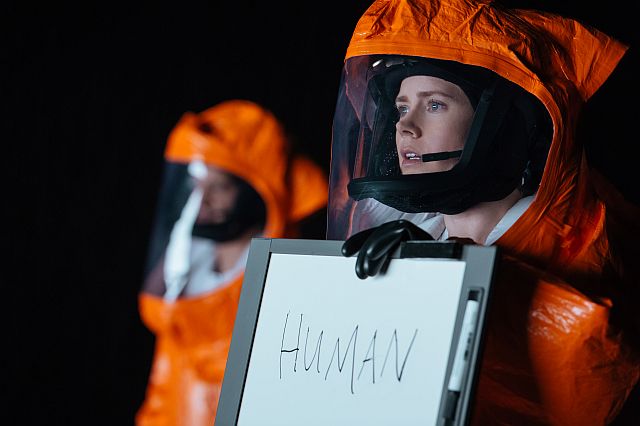
Amy Adams (right) as Louise Banks in ARRIVAL by Paramount Pictures
DO “aliens” speak English?
Or do they understand and can converse in Mandarin Chinese, Arabic or Hindi?
These and other key questions are manifested when 12 massive spaceships arrive without warning, and it’s up to uber-linguist Amy Adams (“Man of Steel”) to figure how to say “Nihao” in “Arrival,” a Best Picture favorite at the Academy Awards this month.
And arrive they do.
Based on Ted Chiang’s “Story of Your Life” and adapted for the screen by Eric Heisserer, “Arrival” is not the standard science fiction movie you might be expecting. This is a “thinking man’s” sci-fi film.
Adams’ Louise Banks—a single mother still deeply grieving from the cancer-stricken death of her eight year old daughter—is plucked out of her home by US Colonel Weber (Forest Whitaker from “Rogue One: A Star Wars Story”) and within hours is whisked inside the massive (and hovering) alien craft somewhere in Montana.
We know they are aliens because (1) they are not hovering over the White House (2) they did not arrive with an engraved invitation for lunch and (3) it’s a sci-fi movie.
Hello!
Banks is joined by fellow linguist Ian Donnelly (Jeremy Renner of “The Avengers”) and just like that, she is confronted by two, 20-foot-tall “squid”—like creatures—separated by an impenetrable wall separated on one side with methane gas for the outer space visitors and oxygen nitrogen atmosphere on the other—both lethal for either species to consume.
Jeremy Renner as Ian Connelly
Within an instant, all global military forces are placed on high alert, frustrated by the utter lack of communication from these unwanted visitors.
Banks and her linguistic counterparts around the globe present numerous forms of spoken and visual languages, completely in vain. She then realizes that all humanity—including the Americans—are thinking like humans.
Director Denis Villeneuve (“Sicario”) keeps the pace solely on Banks who is “fading” in and out of reality from the deep-seeded memories of her daughter. Since neither side (alien or human) can truly understand each other’s motives, “Arrival” instead becomes a study into empathy and sensitivity.
Not ray beans or nuclear bombs.
Short of that, “Arrival” is an edge-of-your-seat adrenalin rush and is thoroughly engaging; the first sight of the space ship hovering over the Montana plains is as captivating and frightening as anything previously seen on film.
To grasp the magnitude of “Arrival,” dear reader, is to separate yourselves from thinking of the Millennium Falcon and “Star Wars” and open your mind and heart to other more powerful (and thoughtful) enquiries.
Since the time of the Tower of Babel when collective humanity once spoke only the original Adamic language, and then in a blink, to instantly hundreds of difference languages being spoken and individually thought — people of the ancient world probably went through the same reactions of fear and terror that Ms. Banks is facing. With spaceships arriving without notice in Denmark, Australia, Venezuela, Greenland, Japan, China, Sudan, the United Kingdom, Siberia and the Black Sea of Russia, the frustration levels by the world’s top linguists, including Banks and Donnelly, rise to a fever pitch as the world military powers are a hair trigger away from intergalactic war.
Forest Whitaker (as Colonel Weber) and Amy Adams (Louise Banks) in a scene from “Arrival”
Clearly the “aliens” want to communicate with their Earthly counterparts and Banks is in a race against time, making numerous visits to “speak” with the aliens within the Montana-landed spaceship.
Each encounter with the visitors from outer space is seemingly a trip into frustration.
“Arrival” is a strong film, rooted in unanswerable questions, covered with suspicion and seasoned with guile.
Eventually as the answers of communication are unraveled, it is Banks’ humanity and the overwhelming grief she feels from the loss of daughter that bridges the gap between species.
“Arrival” needs to be seen.
It has a message of hope for humanity that transcends our linguistic barriers and like the ancient people from the Tower of Babel, gives hope for a future that spans many nations, tongues and peoples.
Questions, comments or travel suggestions, write me at readingruffolos@gmail.com.